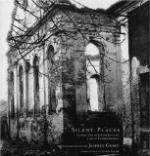For the Post was absolutely unchanged from that other summer evening of over a year ago when they had started out into the Silent Places. The familiarity of this fact, hitherto, for some strange reason, absolutely unexpected, reassured them their places in the normal world of living beings. The dead vision of the North had left in their spirits a residuum of its mysticism. Their experience of her power had induced in them a condition of mind when it would not have surprised them to discover the world shaken to its foundations, as their souls had been shaken. But here were familiar, peaceful things, unchanged, indifferent even to the passing of time. Involuntarily they drew a deep breath of relief, and, without knowing it, re-entered a sanity which had not been entirely theirs since the snows of the autumn before.
Over by the guns, indistinct in the falling twilight, the accustomed group of voyageurs and post-keepers were chatting, smoking, humming songs in the accustomed way. The low velvet band of forest against the sky; the dim squares of the log-houses punctuated with their dots of lamplight; the masses of the Storehouse, the stockade, the Factory; the long flag-staff like a mast against the stars; the constant impression of human life and activity,—these anodynes of accustomedness steadied these men’s faith to the supremacy of human institutions.
On the Factory veranda could be dimly made out the figures of a dozen men. They sat silent. Occasionally a cigar glowed brighter for a moment, then dulled. Across a single square of subdued light the smoke eddied.
The three travellers approached, Sam Bolton in the lead, peering through the dusk in search of his chief. In a moment he made him out, sitting, as always, square to the world, his head sunk forward, his eyes gleaming from beneath the white tufts of his eyebrows. At once the woodsmen mounted the steps.
No one stirred or spoke. Only the smokers suspended their cigars in mid-air a few inches from their faces in the most perfect attitude of attention.
“Galen Albret,” announced the old woodsman, “here is the Ojibway, Jingoss.”
The Factor stirred slightly; his bulk, the significance of his features lost in obscurity.
“Me-en-gen!” he called, sharply.
The tall, straight figure of his Indian familiar glided from the dusk of the veranda’s end.
“To-morrow at smoke time,” commanded the Factor, using the Ojibway tongue, “let this man be whipped before the people, fifty lashes. Then let him be chained to the Tree for the space of one week, and let it be written above him in Ojibway and in Cree that thus Galen Albret punishes those who steal.”
Without a word Me-en-gan took the defaulter by the arm and conducted him away.
Galen Albret had fallen into a profound silence, which no one ventured to break. Dick and Sam, uncertain as to whether or not they, too, were dismissed, shifted uneasily.




